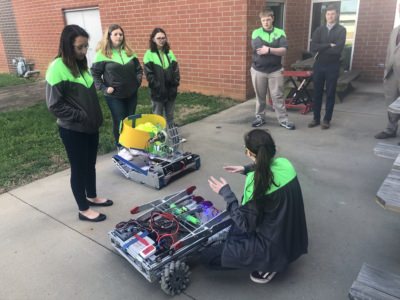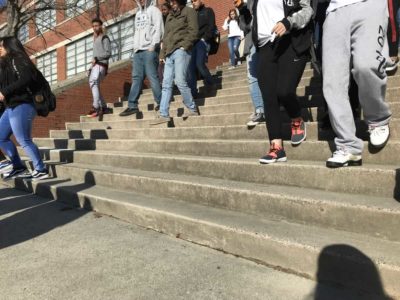How well children read by third grade can determine how well they do in life. But learning to read, it just so happens, involves more than words on a page.
When Rachel and Anthony sat on the floor with their 2-year-old son at an active reading workshop at Charlotte, N.C.’s Scaleybark library, they didn’t just read through the picture book, “I Stink.” They stopped to talk with Marcus about unfamiliar words and pantomime the words.
“Who am I?” Anthony read. “I’ve got lights. Ten W-I-D-E tires. …”
Before turning the page, Anthony turned to Marcus: “Do you know what ‘wide’ means?”
He showed his son: “Not like this,” he said, holding his hands close together. “Like this,” he said, extending them wide apart.
Marcus, who was 2, mimicked his father. “Wide!,” he squealed and spread his hands as far apart as he could.
The library’s active reading workshops are one of a number of programs supported by the two-year-old Read Charlotte initiative. The nonprofit formed after a national study found that only 40 percent of third-graders in Charlotte-Mecklenburg Schools read on grade level. If children are behind by third grade, studies show, they are likely to never catch up.
Alarmed by the statistics and what they could mean for the economy, Duke Energy joined other corporations in investing $5 million toward the first five years of Read Charlotte, which hopes to double the literacy rate by 2025. (Duke Energy’s share: $500,000.)
The company has also partnered with literacy programs in other states: In South Carolina, with Reading is Fundamental to provide a summer reading program; in Indiana, with the Power of Reading Summit for teacher professional development.
Why is an energy company supporting literacy programs?
Think of it as an investment in the future.
Literacy is related to long-term workforce planning and economic competitiveness. A study from the Business Roundtable found that nearly 98 percent of chief executives reported challenges finding workers with the necessary skills.
“Investing in programs that build our current and future workforce is critical not just for our company, but also for our region’s continued economic growth,” said Jennifer DeWitt, Duke Energy director of foundation programs and community affairs who also serves on the board of Read Charlotte. “We believe that bright futures begin with strong reading skills. Supporting literacy programs at an early age prepares students for success in school, which leads to career opportunities.”
Munro Richardson, executive director of Read Charlotte, said the nonprofit looks forward to working with Duke Energy employees to teach them about active reading and how to use it, whether with their own children or with children they volunteer to help.
The active reading program is one of a number of partnerships between Read Charlotte and literacy groups. Read Charlotte’s job is to coordinate the various programs. Another partnership involves Reach Out and Read Carolinas, which encourages doctors conducting well-child visits to prescribe reading aloud every day. The program provides books for families to take home.
Richardson said third grade “is the dividing line between learning to read and reading to learn.”
“Imagine ‘Charlotte’s Web,’ a typical third-grade book,” Richardson said. “A child who is able to appreciate ‘Charlotte’s Web’ on his or her own, that child has a 90 percent chance of graduating from high school. However, if that child is not able to read ‘Charlotte’s Web’ or a book like that by the end of third grade, that child is four times more likely to drop out of high school.”
Richardson likens the situation to running a marathon. “Some kids are at the starting line,” he said. “Others are 100 yards back. But they have to run the same race. Our job at Read Charlotte is to try to get as many of those kids at the starting line.”
Only if they learn to read, he said, can they read to learn.
Editor’s note: This article was originally published by Duke Energy. It has been posted with the author’s permission.





